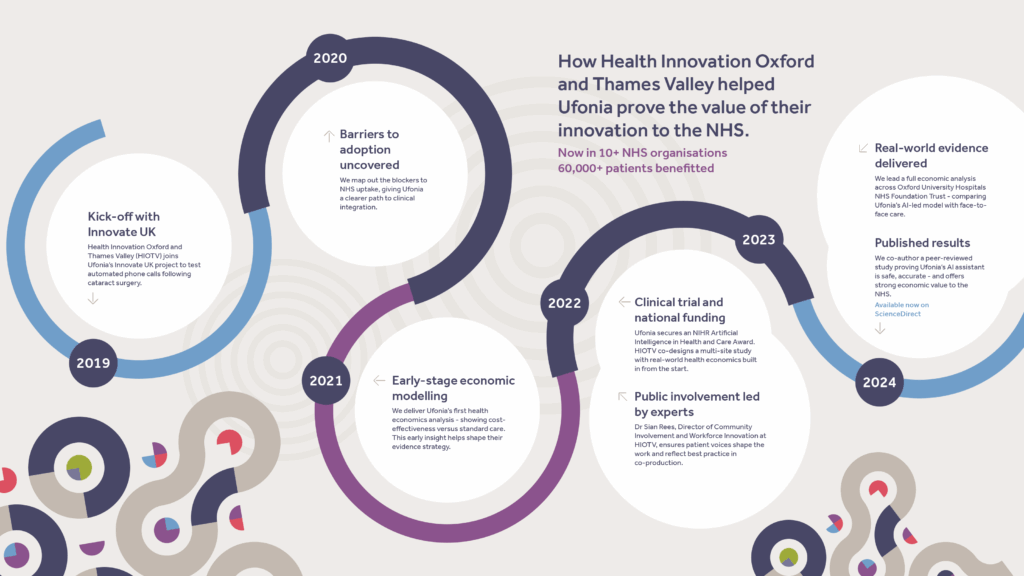Overview
Ufonia, an Oxford-based digital health company, has built an automated voice system powered by artificial intelligence (AI) for use in routine clinical conversations.
Since 2018 Health Innovation Oxford and Thames Valley (HIOTV) has provided extensive support in developing the AI-powered tool called Dora. This started with partnering in successful funding applications and went on to include a real-world economic analysis study into its potential for identifying post-operative cataract surgery patients who require further assessment.
Where clinically appropriate, the automated phone call offers an alternative to a hospital appointment, freeing up skilled nurses to focus on patients with more complex needs, as well as reducing waiting lists and costs. Patients answer the phone in the way they would any other call – they do not need new devices, apps or training. Based on the subsequent conversation, Dora identifies those patients who are recovering well and those needing to be seen by a clinician. Calls can be scheduled for multiple times to track progress and intercept problems. For patients without complications it means fewer journeys to hospital appointments, improving convenience and bringing environmental benefits too.
Dora has been applied in operational bottlenecks, particularly high volume, low complexity routine care. The initial focus has been on cataract surgery, the most common operation in the NHS with 400,000 procedures carried out every year in the UK. It involves replacing the eye’s natural lens with an artificial one to deal with blurred vision. Tens of thousands of automated calls have already been made to patients following cataract surgery with hundreds of hours of clinicians’ time freed up for face-to-face appointments with the patients who need them. A study published in The Lancet’s eClinicalMedicine journal in 2024 found Dora’s decisions in calls to patients after surgery strongly aligned with those of the supervising ophthalmologist. The number of NHS organisations using Dora has increased to more than ten nationwide including five in our region.
Click here to view the full Ufonia timeline (pdf)
Input from Health Innovation Oxford and Thames Valley
Support from HIOTV dates back to 2018. We helped Ufonia secure funding from Innovate UK, the NHS/NIHR AI in Health and Care Award, SBRI Healthcare and others.
We carried out a feasibility study to explore Dora’s utility in clinical practice and the potential barriers to adoption. We interviewed clinical stakeholders about how the technology would integrate into the care pathway. The results were discussed with NHS clinicians and commissioners to gain insights into how the potential barriers could be overcome. Read more about how we consulted clinical stakeholders.
We developed a health economics model comparing the cost of the Ufonia platform with the current standard care (nurse-led telephone calls). The structured qualitative and quantitative analysis provided robust conclusions which have helped Ufonia gain further interest and investment.
We conducted a real-world economic analysis study into Dora’s potential for identifying post-operative cataract surgery patients who require further assessment. Clinical data from the trial was collected from patients’ electronic health records up to three months after surgery. The cost analysis aimed to provide an overview of the potential cost savings from using Dora in the cataract post-operative care pathway at Oxford University Hospitals (OUH), and to evaluate the cost-effectiveness of autonomous calls compared to existing standards of care at both hospitals.
We also explored patients’ experiences of the existing pathway and their views on Dora. Findings from this exercise highlighted the importance of including AI at the right stage of the pathway and the potential pros and cons as seen by patients. We are now supporting the development of a multi-lingual version of Dora.
Achievements
The number of NHS sites using Dora has grown from the initial two sites and now runs to double figures.
Frimley Health was highly commended in the HSJ Digital Awards in July 2024 in partnership with Ufonia in the ‘Driving change through AI and automation’ category.
Results based on the experiences of 200 cataract patients using Dora were published in The Lancet eClinicalMedicine in July 2024.
In August 2024 Dora was featured during a BBC South short multi-media series on digital and AI developments in healthcare.
What people said
“Health Innovation Oxford and Thames Valley has been an essential partner in ensuring Dora is not only safe and effective, but truly centred on the needs of all patients. Their leadership in public and patient involvement helped us build trust from the outset — by ensuring we listened to voices that are too often excluded, including people with learning disabilities, autism, and underrepresented communities. Early on, they helped us understand how to approach sensitive topics, including conversations around cancer care.
“More recently, they’ve supported us in developing Dora for patients who don’t speak English — running focus groups to explore how multilingual AI conversations can be culturally sensitive and appropriate. This inclusive, co-productive approach has shaped how we design and deliver Dora.
“Crucially, HIOTV has also supported our early evidence generation and health economic evaluation — providing critical insights into Dora’s clinical effectiveness, safety, and cost-efficiency. This early-stage support enabled us to demonstrate value to the NHS and build a strong foundation for wider adoption.”
Aisling Higham, Medical Director, Ufonia
“Since the trial, an updated version of Dora has been deployed at OUH as the default system for post-cataract surgery assessment for thousands of patients. We have now also expanded its use to pre-operative assessments, where Dora runs through a checklist of screening questions, including whether or not the patient wishes to have surgery for their cataract. The information is logged on our electronic medical records, thus speeding up the face-to-face nurse-led pre-assessment.”
Kanmin Xue, Honorary Consultant Ophthalmologist and co-Principal Investigator at Oxford University Hospitals (OUH)
Next steps
We are supporting the development of a multi-lingual version of Dora.
The focus is also broadening to look at potential applications at other stages in the clinical pathway and in other clinical areas. These include triage of head and neck cancer and osteoporosis.

